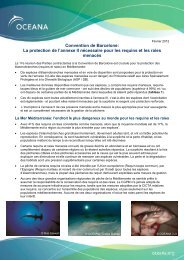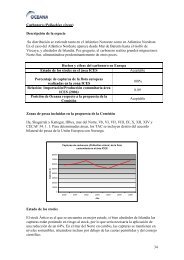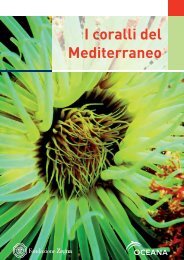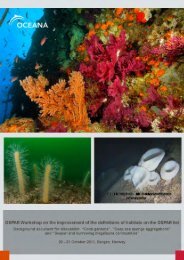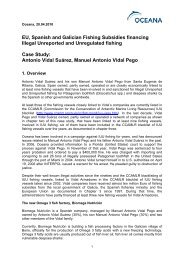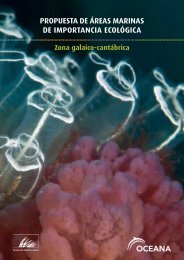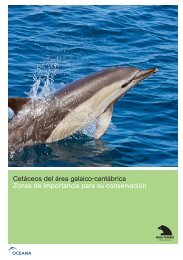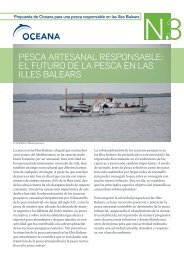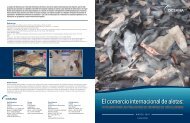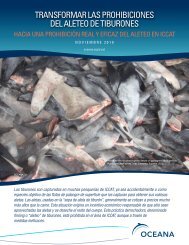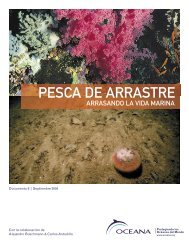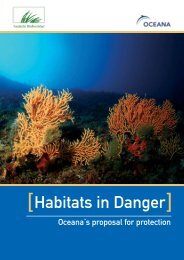Download Oceana Magazine: Winter 2010 PDF
Download Oceana Magazine: Winter 2010 PDF
Download Oceana Magazine: Winter 2010 PDF
You also want an ePaper? Increase the reach of your titles
YUMPU automatically turns print PDFs into web optimized ePapers that Google loves.
<strong>Oceana</strong><br />
in the canaries<br />
oceana's ranger returns<br />
from two months in<br />
spain's african jewel<br />
defeating coal<br />
plants in chile<br />
plUs<br />
23,000 square miles<br />
of deep-sea corals saved<br />
WINTER <strong>2010</strong><br />
oceana.org<br />
OCEANA.ORG | 1
© OCEANA | Carlos Suárez<br />
contents<br />
featUres<br />
4 Ranger in the Canary Islands<br />
<strong>Oceana</strong>'s campaigners document rare<br />
species over two months on the water.<br />
7 January Jones on Capitol Hill<br />
The actress and <strong>Oceana</strong> spokesperson<br />
lobbies for the Shark Conservation Act.<br />
8 Stopping Coal Plants<br />
<strong>Oceana</strong> launches a new campaign<br />
to prevent coal plants in Chile's rich<br />
Punta de Choros.<br />
© OCEANA | Lindsay Orlowski<br />
2 WINTER | WINTER <strong>2010</strong> <strong>2010</strong><br />
On the Cover<br />
Flaming reef lobster in Tenerife,<br />
the largest of the Canary Islands.<br />
Photo © OCEANA | Carlos Suárez<br />
4<br />
The <strong>Oceana</strong> Ranger<br />
and ROV in the<br />
Canary Islands.<br />
departments<br />
1 CEO’s Note<br />
2 Making Waves<br />
10 Party Photos<br />
The 2009 Partners Award<br />
Gala and launch of<br />
<strong>Oceana</strong>'s New York office.<br />
13 Chef’s Corner<br />
Cindy and Ted Walters of<br />
California's Passionfish.<br />
7<br />
<strong>Oceana</strong> campaigns to protect and restore the world’s oceans.<br />
Our team of marine scientists, economists, lawyers and<br />
advocates win specific and concrete policy changes to reduce<br />
pollution and to prevent the irreversible collapse of fish<br />
populations, marine mammals and other sea life. Global in<br />
scope and dedicated to conservation, <strong>Oceana</strong> has campaigners<br />
based in North America, Europe and South and Central<br />
America. More than 300,000 members and e-activists in over<br />
150 countries have already joined <strong>Oceana</strong>. For more information,<br />
please visit www.oceana.org.<br />
Board of directors<br />
Keith Addis, Chair<br />
Dr. Kristian Parker,<br />
Vice Chair<br />
James Sandler, Treasurer<br />
Simon Sidamon-Eristoff,<br />
Secretary<br />
Herbert M. Bedolfe, III<br />
Ted Danson<br />
César Gaviria<br />
María Eugenia Girón<br />
Stephen P. McAllister<br />
Michael Northrop<br />
Dr. Daniel Pauly<br />
Sally-Christine Rodgers<br />
Sam Waterston<br />
Valarie Whiting<br />
ocean coUncil<br />
Susan Cohn Rockefeller, Chair<br />
Lea Haratani, Vice Chair<br />
Anne Alexander Rowley<br />
Dr. Andrew Bevacqua<br />
Pierce Brosnan<br />
Deborah Buck<br />
Dan and Beth Cort<br />
Andrew and Sydney Davis<br />
Kelsey Grammer<br />
Hardy Jones<br />
J. Stephen and Angela Kilcullen<br />
Eve Kornyei<br />
Larry Kopald<br />
Willa and Ted Lutz<br />
Carolyn Marks Blackwood<br />
Aaron Peirsol<br />
Nicole Polizois<br />
Linus Roache<br />
Ruthie Russ<br />
Mark Ryavec<br />
Victoria Stack<br />
Peter Stranger<br />
Annett Wolf<br />
Nicole Woody<br />
oceana<br />
Chief Executive Officer<br />
Andrew Sharpless<br />
Executive Vice President<br />
& General Counsel<br />
James Simon<br />
Senior Vice President,<br />
North American Oceans<br />
& Chief Scientist<br />
Michael Hirshfield, Ph.D.<br />
Vice President,<br />
European Oceans and Seas<br />
Xavier Pastor<br />
Vice President, South American<br />
Oceans & Antarctica<br />
Alex Muñoz<br />
Vice President, Belize<br />
Audrey Matura-Shepherd<br />
Vice President, Pacific<br />
& Senior Advisor<br />
Jim Ayers<br />
Vice President, Strategic<br />
Marketing & Communications<br />
Matthew Littlejohn<br />
Vice President, Global<br />
Development<br />
Bettina Alonso<br />
Director, Pacific<br />
Susan Murray<br />
editorial staff<br />
Senior Editor<br />
Suzannah Evans<br />
Online Editor<br />
Emily Fisher<br />
Graphic Design<br />
Lindsay Orlowski
the 'fishing ape'<br />
Talk to people every day about the<br />
oceans, as I do, and you encounter a<br />
paradox. People love the oceans. Yet<br />
most of us are oblivious to the many clear<br />
measures showing ongoing ocean collapse.<br />
Perhaps the cause of this paradox is dimly<br />
visible in the mists of our early evolution as<br />
Homo sapiens.<br />
Evidence of popular love of the ocean is<br />
easy to find. Consider where many of us<br />
go when we are granted the freedom of<br />
summer vacation: to the water’s edge.<br />
People also like to eat the creatures in the<br />
sea. And consider the benefits to<br />
human health of the fatty acids present<br />
in many fish.<br />
Why aren’t more people loudly insisting on<br />
strong action by our policymakers to stop<br />
ocean collapse?<br />
There are many reasonable answers.<br />
The last ten years – called “The Decade<br />
from Hell” in a recent TIME cover story<br />
– brought a slew of new and difficult<br />
international challenges, including<br />
terrorism, financial collapse and climate<br />
change. People are understandably<br />
distracted. Moreover, the creatures of the<br />
sea are invisible to most of us until they<br />
show up on our dinner plates.<br />
If you live in the USA, Europe or Japan,<br />
assessing the state of the world’s oceans<br />
by the range of choices at your grocery<br />
store is deeply misleading. Because the<br />
developed world pays the most for fish,<br />
the last fish in the world will be served<br />
on its plates.<br />
Which brings me to the “aquatic ape”<br />
hypothesis. Several iconoclastic thinkers<br />
have offered a controversial, but intriguing,<br />
hypothesis about what factors drove<br />
humans to evolve differently from other<br />
primates. Why, for example, are we<br />
hairless compared to our primate cousins?<br />
Why are we bipedal? Why do we store fat<br />
differently? Why are the fatty acids in fish<br />
so very good for us?<br />
Their hypothesis is that more than two<br />
million years ago, ancestors of ours spent<br />
a lot of time in a coastal environment, and<br />
that got them interested in capturing and<br />
eating fish and other marine creatures.<br />
Going into the water in search of seafood<br />
drove selection that rewarded hairlessness<br />
(for the same reasons that dolphins<br />
and whales are hairless mammals),<br />
the ability to stand on two feet (it was<br />
easier to breathe and the water helped<br />
support early efforts to become erect),<br />
subcutaneous fat (for underwater warmth,<br />
again like a dolphin or a whale) and tuned<br />
our metabolism to the benefits of a heavily<br />
seafood-based diet.<br />
This hypothesis is highly controversial,<br />
and although intriguing to many biologists,<br />
is soundly rejected by most paleoanthropologists.<br />
They point out that there<br />
is no fossil evidence consistent with<br />
the theory.<br />
<strong>Oceana</strong> is not taking a stand on this<br />
question – we have our hands full winning<br />
policy changes that will restore and protect<br />
abundant oceans. But the idea that we<br />
are descended from a group of ancestral<br />
apes who discovered fishing is appealing<br />
to me. It might explain, for example, our<br />
apparently limitless ability to prey on the<br />
creatures of the sea. It might also explain<br />
why we are drawn to the water’s edge on<br />
our vacations. If this is indeed an ancestral<br />
attraction, it’s time for us “fishing apes” to<br />
stop loving the oceans to death.<br />
For the oceans,<br />
Andrew Sharpless<br />
CEO, <strong>Oceana</strong><br />
ceo’s note<br />
<strong>Oceana</strong> is grateful for the grants,<br />
contributions and support it has<br />
received from dozens of foundations<br />
and companies and thousands of<br />
individuals. <strong>Oceana</strong> wishes to thank all<br />
of its supporters, especially its founding<br />
funders as well as foundations that in 2008<br />
awarded <strong>Oceana</strong> grants of $1 million or<br />
more: Arcadia Fund, Oak Foundation, The<br />
David and Lucile Packard Foundation,<br />
The Pew Charitable Trusts, Rockefeller<br />
Brothers Fund and Sandler Foundation.<br />
For more information, please see <strong>Oceana</strong>’s<br />
annual reports at www.oceana.org.<br />
OCEANA.ORG | 1
maKing WaVes<br />
2 | WINTER <strong>2010</strong><br />
arctic protections take effect<br />
In December, the U.S. part of the Arctic<br />
Ocean was officially protected from<br />
expanded commercial fishing. Nearly<br />
200,000 square miles of ocean wilderness<br />
– an area much larger than California<br />
© Peter Hemming<br />
23,000 square miles of deep-sea coral in southeast U.s. protected<br />
After five years of advocacy by <strong>Oceana</strong><br />
and others in the environmental<br />
community and fishing industry, the<br />
South Atlantic Fishery Management<br />
Council approved a plan to protect more<br />
than 23,000 square miles of rare deep-sea<br />
coral from North Carolina to Florida from<br />
destructive fishing gear.<br />
The plan will restrict the use of bottom<br />
trawls, whose nets drag the ocean floor<br />
and have destroyed thousand-year-old<br />
mercury bill clears U.s. house committee<br />
In October, <strong>Oceana</strong> was instrumental in<br />
clearing the Mercury Pollution Reduction<br />
Act (H.R. 2190) past a critical legislative<br />
hurdle, the U.S. House Energy and<br />
Commerce Committee. The bill, which<br />
was sponsored by Rep. Jan Schakowsky<br />
(D-IL), would require chlor-alkali plants<br />
to end their unnecessary use of mercurybased<br />
technology in chlorine and caustic<br />
soda production. <strong>Oceana</strong> is now working<br />
to ensure the bill's passage in the Senate<br />
and on the House floor.<br />
– are now closed to commercial fishing<br />
unless and until there is adequate<br />
information to manage fisheries<br />
sustainably in the Arctic’s fragile<br />
ecosystem.<br />
coral reefs, including the Oculina banks,<br />
an area of vulnerable deep-sea coral<br />
habitat off the east coast of Florida. The<br />
Oculina banks were eventually protected<br />
by the Council, but not before the corals<br />
suffered irreversible damage from trawls<br />
and dredges.<br />
Deep-sea corals off the southeast coast<br />
include hundreds of pinnacles up to 500<br />
feet tall that provide habitat for many<br />
species, including sponges that are being<br />
<strong>Oceana</strong> campaigned for nearly five<br />
years to persuade nine factories to<br />
switch from mercury-based technology<br />
to mercury-free alternatives. Only<br />
three companies, Ashta Chemicals,<br />
Olin Corporation and PPG Industries,<br />
with four factories in the U.S., have<br />
refused to switch to cleaner, mercuryfree<br />
technology, despite the fact that<br />
doing so would eliminate major sources<br />
of mercury pollution, make chlorine<br />
production more efficient, increase<br />
Despite the harsh conditions, the Arctic<br />
is home to vibrant communities and<br />
ecosystems. It provides vital habitat for<br />
polar bears, whales, walrus, fish, birds<br />
and other animals.<br />
The closure is one of the largest<br />
preventive measures in fisheries<br />
management history, and will be crucial<br />
for protecting the Arctic. The region is<br />
warming at twice the rate of the rest of<br />
the planet and has seen unprecedented<br />
sea ice loss in recent years. Currently<br />
undisturbed by commercial fishing<br />
nets, trawls and longlines, the U.S.<br />
Arctic might have become the next<br />
fishing hotspot as waters become more<br />
navigable and fish species expand<br />
northward as the region continues<br />
to warm.<br />
maKe WaVes:<br />
www.oceana.org/act<br />
left: Underwater view of<br />
arctic sea ice.<br />
tested to develop drugs for the treatment<br />
of cancer, heart disease and more.<br />
The Council’s decision, which will also<br />
help restore the long-term productivity<br />
of commercially valuable fisheries<br />
in the area, has been sent to the<br />
National Oceanic and Atmospheric<br />
Administration (NOAA). <strong>Oceana</strong><br />
anticipates the new regulation will take<br />
effect in early <strong>2010</strong>.<br />
profitability and protect jobs.<br />
In 2009, <strong>Oceana</strong> reported in a white paper<br />
that Ashta Chemicals was continuing<br />
to emit mercury despite claiming zero<br />
emissions in official reports to the<br />
Environmental Protection Agency.<br />
An <strong>Oceana</strong> scientist documented<br />
mercury levels up to 20 times higher than<br />
background levels in the area surrounding<br />
the Ashta plant in northeast Ohio.
deepwater canyons saved from trawling<br />
The U.S. government has protected four<br />
deepwater canyons off the mid-Atlantic<br />
from bottom trawling and dredging,<br />
destructive fishing methods that can<br />
devastate ecosystems in a single pass.<br />
The four canyons, known as Oceanographer,<br />
Lydonia, Veatch and Norfolk, are<br />
among the best-documented deepwater<br />
loggerhead and leatherback sea turtle petitions advance<br />
After failing to meet a 12-month legal<br />
deadline, and following a lawsuit by<br />
<strong>Oceana</strong> and conservation partners, the<br />
U.S. government agreed to respond to<br />
petitions from <strong>Oceana</strong>, the Center for<br />
Biological Diversity and the Turtle Island<br />
Restoration Network for increased<br />
protections for two sea turtle species in<br />
U.S. waters off the east and west coasts.<br />
Two of the three petitions focus on<br />
populations of loggerheads in the Atlantic<br />
and Pacific oceans. The groups have<br />
urged the National Marine Fisheries<br />
Service to designate the north Pacific<br />
and western north Atlantic loggerheads<br />
as distinct population segments and<br />
to change their status under the<br />
© Tim Calver<br />
habitats in the U.S. The canyons are<br />
home to a multitude of marine animals,<br />
including sponges, corals, lobsters<br />
and fish.<br />
This landmark action by the Mid-Atlantic<br />
Fishery Management Council, which<br />
took effect on Nov. 1, banned the use of<br />
bottom trawls and dredges in the canyon<br />
Endangered Species Act from threatened<br />
to endangered. The petitions also call for<br />
increased protections in the loggerheads’<br />
key nesting beaches and marine habitats.<br />
The third petition urges the government<br />
to protect key migratory and foraging<br />
habitat for endangered leatherbacks in<br />
the waters off California and Oregon by<br />
designating the area as critical habitat.<br />
Endangered leatherbacks migrate more<br />
than 6,000 miles from nesting beaches<br />
in Indonesia to feed on the abundant<br />
jellyfish in these waters.<br />
A recent worldwide status review showed<br />
that northwest Atlantic and north Pacific<br />
loggerheads are currently at risk of<br />
maKing WaVes<br />
areas year-round. The ban was established<br />
as part of the rules for fishing for<br />
Atlantic tilefish.<br />
Offshore canyons are also important to<br />
the region’s recreational fishing community.<br />
The new regulations will have no<br />
impact on fishing for marlin, tuna or other<br />
gamefish that swim above the canyons.<br />
extinction. Loggerheads have declined<br />
by at least 80 percent in the north<br />
Pacific. Meanwhile, Florida beaches,<br />
thought to host the second-largest<br />
loggerhead nesting population in the<br />
world, have seen a decline in nesting<br />
of more than 40 percent in the past<br />
decade, and recent nesting data<br />
showed 2009 to be one of the worst<br />
sea turtle nesting years on record.<br />
In addition to demanding that the<br />
government protect sea turtles<br />
and their habitat under existing<br />
law, <strong>Oceana</strong> continues to work for<br />
comprehensive legislation that would<br />
protect U.S. sea turtles in the water<br />
as well as on land.<br />
Below: a nesting<br />
leatherback.<br />
OCEANA.ORG | 3
In The Canaries<br />
Unveiling<br />
Spain's<br />
African<br />
Jewel<br />
By Emily Fisher<br />
the canary islands are home to rich underwater<br />
ecosystems that are among the most vibrant in the<br />
world. colorful gorgonians, black coral and rare<br />
sponge forests thrive here, thanks to a ban that has<br />
prevented bottom trawling in the region since 2005.<br />
4 | WINTER <strong>2010</strong><br />
In 2009, the Ranger set sail for the Canaries, documenting this<br />
special place and many of the unusual species that call it home.<br />
Over two months, the crew found a dozen species never before<br />
seen in the Canary Islands, and filmed many rare species, such<br />
as three-foot-tall glass sponges, Venus fly-trap anemones and<br />
lollipop sponges.<br />
The Canaries, a necklace of volcanic islands 60 miles off the<br />
coast of northwest Africa, were discovered in the first century<br />
A.D. by an explorer commissioned by Roman emperor<br />
Augustus. Centuries later, the seafloor surrounding the islands<br />
is still mostly unexplored.<br />
The Ranger’s crew completed a total of 81 dives, including 32<br />
with divers and 49 with an underwater robot (ROV) that dove as<br />
deep as 2,300 feet – a Ranger ROV record.<br />
In another milestone, <strong>Oceana</strong> filmed the Saharan seamounts,<br />
© OCEANA | Carlos Suárez<br />
the southernmost seamounts in Spain, for the first time in<br />
history. The crew used the ROV to gather images almost 2,000<br />
feet below the surface of the sea. The seamounts rise from the<br />
ocean floor 13,000 feet below the surface.<br />
The seamounts were decorated with caves, overhangs and<br />
cracks hosting deep-sea sharks, rays and wreckfish, as well as<br />
fields of sponges, gorgonians and corals. Especially common in<br />
the area were sixgill sharks, which are deep-sea sharks measuring<br />
up to 16 feet long and weighing up to 1,000 lbs.<br />
The crew also spotted two rare species closely related to the<br />
famously overfished orange roughy: the Mediterranean silver<br />
roughy and the Darwin’s slimehead.<br />
Not all of the crew’s discoveries were positive. The waters<br />
around the Canary Islands are oligotrophic, meaning they<br />
contain few nutrients to sustain life. As a result, any human<br />
encroachment – coastal development or fisheries, for example –<br />
has a significant impact on the ecosystems. In shallow coastal<br />
areas, the crew found a surprising dearth of fish and a proliferation<br />
of lime urchins, one of the archipelago’s biggest threats. The<br />
urchins devour the island’s algae cover, which is food for many<br />
other species.<br />
continued >
© OCEANA | Carlos Minguell<br />
see more photos and read the creW's on-Board diarY:<br />
http://oceana.org/europe/aboard-the-ranger/canary-islands-2009/<br />
© OCEANA | Carlos Suárez<br />
© OCEANA | Carlos Suárez<br />
clockwise from top left: ranger's roV explores depths beyond<br />
the reach of divers; an oceana diver; a common octopus near<br />
the island of tenerife; a dusky grouper near Veril de Jandía.<br />
OCEANA.ORG | 5
© OCEANA | Eduardo Sorensen<br />
© OCEANA | Eduardo Sorensen<br />
top: an oceana diver documents the seafloor off gran canaria.<br />
Bottom: a madeira rockfish gapes its mouth.<br />
6 | WINTER <strong>2010</strong><br />
ranger's crew documented many<br />
species that were never seen<br />
before in the canary islands.<br />
< continued<br />
Canary<br />
Islands<br />
Western<br />
Sahara<br />
Portugal<br />
Morocco<br />
Spain<br />
Algeria<br />
When the crew visited La Palma Marine Reserve, however, the<br />
contrast was visible.<br />
“Once again we confirmed the benefits of creating protected<br />
areas or reserves,” photographer Eduardo Sorensen wrote in the<br />
expedition diary from that day. “As soon as you submerge into<br />
the reserve, a healthy ecosystem becomes evident.”<br />
Not only are protected areas visibly healthier, they are also<br />
required by the U.N. Convention on Biological Diversity, which<br />
states that 10 percent of the global marine environment be<br />
protected by 2012. Only 0.15 percent of the islands’ sea surface<br />
is protected. Overall, 2.7 percent of the European Union’s waters<br />
are protected.<br />
In order to mount a campaign to create new protected areas in<br />
the Canaries, it is crucial to first determine what’s at stake in the<br />
dark depths of the sea, according to Riki Aguilar, director of the<br />
expedition. "The lack of knowledge of the communities existing<br />
at great depths is one of the biggest problems when it comes<br />
time to decide which areas must be protected,” he said.<br />
Now that the crew is back on the Spanish mainland, they are<br />
working on a scientific report on the state of Canarian marine<br />
ecosystems, drawing conclusions about the state of the seabeds<br />
and the threats they face.<br />
For more information on <strong>Oceana</strong>'s on-the-water campaigns,<br />
visit oceana.org.
© OCEANA | Lindsay Orlowski<br />
actress January Jones made her first<br />
visit to Capitol Hill in September<br />
when she came to lobby on behalf of the<br />
Shark Conservation Act of 2009.<br />
Along with <strong>Oceana</strong> federal policy director<br />
Beth Lowell and marine scientist Elizabeth<br />
Griffin, Jones, who is best known<br />
for her role as Betty Draper on the hit<br />
drama “Mad Men,” visited with members<br />
of Congress including Senators Frank<br />
Lautenberg (D-NJ) and John McCain (R-<br />
AZ). Senator McCain surprised her with<br />
a quick tour of the Capitol building.<br />
“The spontaneous, private tour of the<br />
Capitol by Senator McCain was a real<br />
highlight,” Jones said. “But my true favorite<br />
part was seeing that the process can<br />
work and that it’s possible to pass good<br />
legislation. It was great to talk with the<br />
senators and to have them listen to what<br />
I had to say.”<br />
Jones’ message of shark conservation<br />
was a hit.<br />
“Two of the senators immediately signed<br />
onto the bill,” she said. “I was surprised<br />
by how supportive they were. I think it’s<br />
a testament to the great work being done<br />
by <strong>Oceana</strong>.”<br />
Less than two months after Jones’ trip<br />
to the Capitol, the Senate Commerce,<br />
Science and Transportation Committee<br />
passed the Shark Conservation Act. The<br />
House of Representatives passed similar<br />
legislation in March.<br />
The legislation would require all sharks<br />
caught in U.S. waters to be landed whole<br />
with their fins still attached. This bill would<br />
put an end to shark finning, the process<br />
of cutting off the fins and discarding<br />
the carcass at sea. Landing sharks with<br />
their fins still attached allows for better<br />
enforcement and data collection for stock<br />
assessments and quota monitoring. The<br />
act would also close a loophole that allows<br />
the transfer of fins at sea as a way to get<br />
around current law. Additionally, the bill<br />
would allow the United States to take<br />
January Jones:<br />
A Voice for<br />
Sharks<br />
action against countries whose shark<br />
finning restrictions are not as effective.<br />
Now, the Shark Conservation Act must<br />
pass the full Senate. Inspired by her<br />
success in her first visit to Washington,<br />
Jones is eager to continue helping protection<br />
sharks from extinction.<br />
“Yes, I would like to come back – to<br />
the White House ceremony for the bill<br />
signing!” she said.<br />
© OCEANA | Lindsay Orlowski<br />
January Jones met with senator frank lautenberg<br />
(d-nJ) during her visit to the hill.<br />
By Suzannah Evans<br />
OCEANA.ORG | 7
Saving Punta de Choros<br />
By Suzannah Evans<br />
© OCEANA | Jim Simon<br />
© OCEANA | Jim Simon<br />
top: members of oceana's board of directors visited punta<br />
de choros in september to witness the area's spectacular<br />
wildlife. Bottom: oceana chief scientist and vice president<br />
for north america, mike hirshfield, walks with board<br />
member dr. daniel pauly on the chilean shore.<br />
8 | WINTER <strong>2010</strong><br />
<strong>Oceana</strong> launches a new campaign to prevent<br />
the construction of three coal-fired power plants<br />
in one of Chile's most diverse ecosystems.<br />
Along Chile’s north-central coast,<br />
the ocean’s currents push a swell<br />
of nutrient-rich, cold water from<br />
the depths to the surface. This natural<br />
phenomenon, known as a coastal upwelling,<br />
occurs in a few places around the<br />
world where the conditions are just right,<br />
and fosters a bonanza of marine life.<br />
At this particular upwelling, near Punta<br />
de Choros, the plankton-rich waters<br />
are buoyed by the Humboldt current<br />
coursing northward from Antarctica.<br />
The upwelling supports a huge community<br />
of wildlife. Eighty percent of the<br />
world’s endangered Humboldt penguins<br />
breed here. Marine mammals that would<br />
normally migrate in search of food stay<br />
here, including a permanent population of<br />
bottlenose dolphins. The incredibly rare<br />
blue whale can be seen here, as well as<br />
endangered diving petrels.<br />
One of Chile’s most important fisheries,<br />
the Chilean abalone – a mollusc also<br />
known as loco – is located here, supplying<br />
as much as 60 percent of the country’s<br />
abalone. Additionally, the region’s stunning<br />
vistas and guaranteed wildlife sightings<br />
make it a prime tourist destination.<br />
This vibrant area is already partially protected<br />
as a marine protected area, Chile’s<br />
first, designated in 2005. But the marine<br />
reserve around the islands of Choros<br />
and Damas isn’t enough to protect this<br />
natural spectacle.<br />
Developers have proposed building three<br />
thermoelectric, coal-fired power plants<br />
less than 12 miles south of Punta de<br />
Choros and the marine reserve. These<br />
plants pose a multitude of threats to a<br />
region that is one of the world’s biodiversity<br />
hotspots.<br />
Located upstream from Punta de Choros,<br />
emissions from the plants would arrive at<br />
the upwelling area in a matter of minutes.<br />
Oil spills from ships carrying coal to<br />
the plants would seep there in a couple<br />
of hours, and the local currents would<br />
retain the pollution within the area. In the<br />
meantime, mercury emissions from the<br />
plants would contaminate the Chilean<br />
abalone and damage an industry critical<br />
to the region’s economic health.<br />
But the most immediate damage could<br />
come from the anti-fouling chemicals<br />
the plants would dump into the ocean
Emissions from the plants would arrive<br />
at Punta de Choros in a matter of minutes.<br />
Oil spills from ships carrying coal would<br />
seep there in a couple of hours.<br />
© OCEANA | Jim Simon<br />
© OCEANA | Eduardo Sorensen<br />
top: south american sea lions. Bottom: endangered<br />
humboldt penguins nest at punta de choros.<br />
every day, along with thousands of gallons<br />
of hot water, according to Dr. Carlos<br />
Gaymer, a professor with the Universidad<br />
Católica del Norte in La Serena, Chile<br />
and Université Laval, Québec, who has<br />
studied the potential effects of power<br />
plants on the Punta de Choros area.<br />
Thermoelectric plants like the ones proposed<br />
here dump huge amounts of water<br />
that is 10 degrees warmer than the cool<br />
waters of the Punta de Choros upwelling.<br />
According to Gaymer, the hot water<br />
and anti-fouling chemicals is a lethal<br />
mix to Chilean abalone. In trials run by<br />
Dr. Katherina Brokordt at the Center for<br />
Advanced Studies in Arid Zones in Co-<br />
quimbo, Chile, using temperatures<br />
below what would actually<br />
come from the plants, all the<br />
abalone died within weeks.<br />
“We know that they don’t<br />
have more than three weeks,”<br />
Gaymer said. “After more than<br />
three weeks, all the marine life<br />
will be killed – and they were<br />
very conservative in their test.”<br />
In September, Gaymer joined<br />
<strong>Oceana</strong>’s board of directors<br />
and senior staff on a day trip<br />
to Punta de Choros, where the<br />
group witnessed firsthand the<br />
region’s stunning biodiversity.<br />
Gaymer presented his research<br />
on the devastating effects the<br />
power plants would have on<br />
wildlife, the surrounding habitat<br />
and human health.<br />
The arguments against building<br />
the coal plants in such a<br />
pristine area are strong, but<br />
Gaymer acknowledges the<br />
challenges.<br />
“It’s clear to every<br />
person that sees all these<br />
arguments, they all say the<br />
same thing, it’s crazy to do<br />
something like that here.<br />
This place is too important<br />
for threatening in this way,”<br />
he said. “The problem is that<br />
political decisions sometimes<br />
say the opposite.”<br />
see more photos:<br />
http://oceana.org/america-del-sur/prensa/oceana-en-punta-choros/<br />
© OCEANA | Eduardo Sorensen<br />
oceana’s campaign<br />
oceana and the local community’s fight to protect<br />
the health and ecology of punta de choros from<br />
the development of three coal-fired power plants<br />
met with early success in november when the<br />
government of chile declined to permit suez<br />
energy to build a port necessary for delivering<br />
coal to the proposed Barrancones plant.<br />
"this is an encouraging sign in our fight against<br />
the serious damage that the proliferation of<br />
these power plants can lead to in chile,” said<br />
alex muñoz, vice president for oceana in south<br />
america. “coal is one of the most polluting energy<br />
sources in the world and we should start to<br />
replace it with cleaner alternatives.”<br />
in addition to halting the development of power<br />
plants near punta de choros, oceana also seeks<br />
to set standards for emissions of carbon dioxide<br />
and mercury and the use and discharge of water<br />
from existing coal-fired power plants in chile,<br />
which currently has no applicable standards.<br />
since 2005, the chilean government has approved<br />
11 projects for power plants currently in various<br />
stages of construction, and another 11 projects<br />
are being evaluated.<br />
OCEANA.ORG | 9
© Weber Sinh | <strong>Oceana</strong><br />
10 | WINTER <strong>2010</strong><br />
The 2009 Partners<br />
Award Gala<br />
<strong>Oceana</strong> honored Dr. Deepak Chopra and Arianna Huffington at its sixth<br />
annual Partners Award Gala on November 20. The celebration was held<br />
at the Los Angeles home of <strong>Oceana</strong> chairman Keith Addis and his wife,<br />
Keri Selig. Proceeds from the Partners Award Gala support <strong>Oceana</strong>’s<br />
campaigns to stop overfishing, protect habitat and stop pollution.<br />
Dr. Deepak Chopra is a globally-recognized author of fifteen best-selling<br />
books on mind-body health, quantum mechanics, spirituality and peace.<br />
He has devoted his life to connecting people in order to build a just,<br />
peaceful and sustainable world and environment.<br />
Arianna Huffington is the co-founder and editor-in-chief of the Huffington<br />
Post, as well as the author of 12 books. Widely recognized as a leading<br />
voice on environmental and conservation issues, she was named one of<br />
the world’s most influential people by Time magazine.<br />
The honorees and 225 guests were treated to a performance by<br />
Eurythmics co-founder and guitarist Dave Stewart, who also introduced<br />
Dr. Chopra. The silent auction items included a trip to Belize in support<br />
of <strong>Oceana</strong>’s campaign to save sharks with actress and campaign<br />
spokesperson January Jones.<br />
The Partners Award acknowledges visionary leaders who are committed<br />
to rich, high-level discourse to improve our world. Chopra and Huffington<br />
join an impressive list of changemakers, including former President<br />
Bill Clinton, Trudie Styler and Sting, Pierce Brosnan, Ted Danson, Sam<br />
Waterston, Don Henley, Jean-Michel Cousteau, Dr. Daniel Pauly, then-<br />
Senator Hillary Clinton and former Vice President Al Gore.<br />
© Dahlhouse Productions | <strong>Oceana</strong><br />
oceana chairman Keith addis, board member ted<br />
danson, January Jones and ceo andrew sharpless.
© Weber Sinh | <strong>Oceana</strong><br />
honoree deepak chopra presented a poem with the musical<br />
accompaniment of eurythmics guitarist dave stewart.<br />
© Dahlhouse Productions | <strong>Oceana</strong><br />
honorees arianna huffington and deepak chopra.<br />
© Weber Sinh | <strong>Oceana</strong><br />
patricia and michael Berns, dierdre hall and andrew sharpless.<br />
OCEANA.ORG | 11
© John Dee<br />
oceana board member sam Waterston, ocean council chair susan cohn rockefeller, John and Joyce Varvatos,<br />
Brenda and alexander von schweickhardt.<br />
12 | WINTER <strong>2010</strong><br />
NY Launch Party<br />
On October 19, Brenda and Alexander von<br />
Schweickhardt graciously opened their<br />
beautiful Manhattan home to celebrate the<br />
launch of <strong>Oceana</strong>’s New York office.<br />
The event was sponsored by Tiffany & Co. and<br />
was attended by <strong>Oceana</strong> board members Ted<br />
Danson and Sam Waterston, and Ocean Council<br />
chairwoman Susan Cohn Rockefeller. Honored<br />
guests included Jeff Goldblum, Tommy, Dee<br />
and Ally Hilfiger, Joyce and John Varvatos,<br />
Sarah Farcy McNitt, Gina Gershon, New York<br />
Jets tackle Damien Woody and his wife Nicole,<br />
New York gubernatorial candidate Rick Lazio,<br />
along with supporters Bettina Zilkha and Jean<br />
Shafiroff.<br />
<strong>Oceana</strong> chairman Keith Addis and executive<br />
vice president Jim Simon were there to welcome<br />
the guests and encourage the attendees to<br />
support <strong>Oceana</strong>’s mission to protect and<br />
preserve the world’s oceans.<br />
© John Dee<br />
© John Dee<br />
© John Dee<br />
top: sam Waterston with ocean council<br />
members ted and Willa lutz.<br />
Bottom: nile rodgers and mick Jones.<br />
damien and nicole Woody with angela and steve Kilcullen.<br />
© John Dee<br />
oceana board member sam Waterston, Jeff goldblum, Brenda and alexander<br />
von schweickhardt and oceana chairman Keith addis.
passionfish<br />
the husband-and-wife team behind passionfish in pacific grove,<br />
california, went green long before it was trendy.<br />
Ted and Cindy Walter – a chef and the daughter of a fisherman – have been<br />
vocal proponents of the sustainable seafood movement ever since launching<br />
their restaurant.<br />
“We opened Passionfish restaurant and planned to serve the catch of our local<br />
fisherman,” said Cindy Walter. “We were disappointed to find few of the local families<br />
I had known bringing in the harvests we’d come to expect. This was a situation we<br />
could not ignore.”<br />
Now, Passionfish is a respected destination for sustainable seafood, and the Walters<br />
welcome the conversation when diners ask why bluefin tuna or Chilean sea bass<br />
aren’t on the menu.<br />
“There are plenty of seafood choices that are sustainable,” Cindy said. “We need to<br />
remember that the ocean sustains our life, and offer a little more respect and thanks<br />
back to our blue planet.”<br />
striped Bass<br />
with moroccan chickpea salad<br />
Serves Six<br />
for the charmoula<br />
1 tbsp. fennel seeds<br />
2 tsp. coarsely chopped fresh rosemary<br />
1 tsp. cumin seeds<br />
1 tsp. dried crushed red pepper<br />
1 tsp. whole white pepper corns<br />
1 cup coarsely chopped fresh Italian<br />
parsley leaves<br />
1 cup chopped fresh cilantro leaves<br />
cup chopped fresh mint<br />
¼ cup fresh lemon juice<br />
3 garlic cloves<br />
1 cup olive oil<br />
6 6-7 ounce bass fillets<br />
for the moroccan salad<br />
2 large red bell peppers<br />
2 flat breads (such as pita bread)<br />
1 15½ oz. can chickpeas, drained<br />
1 cup walnuts, toasted and coarsely<br />
chopped<br />
¼ cup raisins<br />
2 tbsp. drained capers<br />
2 tbsp. olive oil<br />
Charmoula<br />
Combine first five ingredients in spice<br />
grinder until finely ground. Transfer<br />
to blender. Add parsley and next four<br />
ingredients. With blender running,<br />
gradually add oil and blend until course<br />
puree forms. Season to taste with salt.<br />
Place fish on large plate. Pour ¾ cup<br />
charmoula over fish, turning to coat<br />
evenly. Cover and refrigerate for at least<br />
learn more:<br />
visit www.passionfish.net<br />
chef’s corner<br />
one hour and up to one day. Cover and<br />
refrigerate the remaining charmoula to<br />
use as dressing for salad.<br />
Moroccan Salad<br />
Char bell peppers directly over gas flame<br />
or in broiler until blackened on all sides.<br />
Transfer to paper bag and seal tightly. Let<br />
stand for 15 minutes. Peel, seed, and chop<br />
peppers. Toast flat bread directly over gas<br />
flame or in broiler until crisp and charred<br />
on both sides. Tear into bite size pieces.<br />
Preheat oven to 400°F. Place peppers,<br />
bread, chickpeas, and next four ingredients<br />
into a large bowl. Add ¾ cup<br />
charmoula and toss to coat. Season<br />
with salt and pepper.<br />
Heat oil in large ovenproof non-stick skillet<br />
over medium-high heat. Add fish with<br />
marinade still clinging to it, and cook until<br />
brown, or about 3 minutes on each side.<br />
Transfer skillet to oven and roast fish until<br />
thoroughly cooked, about 8 minutes.<br />
Place salad on each serving plate. Top<br />
with bass fillet and serve.<br />
OCEANA.ORG | 13
1350 Connecticut Ave. NW, 5th Floor<br />
Washington, DC 20036<br />
phone: +1.202.833.3900<br />
toll-free: 1.877.7.OCEANA<br />
Global | Washington, DC Europe | Brussels | Madrid North America | Boston | Juneau | Kotzebue | Monterey | New York | Portland | St. Petersburg Central America | Belize City South America | Santiago<br />
<strong>Oceana</strong> is published by <strong>Oceana</strong> Inc. For questions or comments about <strong>Oceana</strong>, or to<br />
subscribe to <strong>Oceana</strong>, please call <strong>Oceana</strong>’s membership department at +1.202.833.3900, e-mail<br />
membership@oceana.org or write <strong>Oceana</strong>, Member Services, 1350 Connecticut Ave. NW, 5th<br />
Floor, Washington, D.C. 20036, USA.<br />
about oceana<br />
oceana campaigns to protect and restore the world’s<br />
oceans. our teams of marine scientists, economists,<br />
lawyers and advocates win specific and concrete<br />
policy changes to reduce pollution and to prevent<br />
the irreversible collapse of fish populations, marine<br />
mammals and other sea life. global in scope and<br />
dedicated to conservation, oceana has campaigners<br />
based in north america, europe and south and central<br />
america. more than 300,000 members and e-activists<br />
in over 150 countries have already joined oceana.<br />
for more information, please visit oceana.org.<br />
Give today at <strong>Oceana</strong>.org/give<br />
<strong>Oceana</strong>’s accomplishments wouldn’t be possible without the support of<br />
its members. You can help <strong>Oceana</strong> fight to restore our oceans with your<br />
financial contribution. Call us today at 1.877.7.OCEANA, go to our website<br />
www.oceana.org/give and click on “give today” or use the envelope<br />
provided in this newsletter. You can also invest in the future of our oceans<br />
by remembering <strong>Oceana</strong> in your will. Please contact us to find out how. All<br />
contributions to <strong>Oceana</strong> are tax deductible. <strong>Oceana</strong> is a 501(c)(3) organization<br />
as designated by the Internal Revenue Service.<br />
<strong>Oceana</strong>’s Privacy Policy: Your right to privacy is important to <strong>Oceana</strong>, and we are<br />
committed to maintaining your trust. Personal information (such as name, address,<br />
phone number, e-mail) includes data that you may have provided to us when making<br />
a donation or taking action as a WaveMaker on behalf of the oceans. This personal<br />
information is stored in a secure location. Credit card donations through the Web<br />
site are made via a secure server. Like other non-profits, <strong>Oceana</strong> may make contact<br />
information (not including e-mail addresses) available to other organizations we believe<br />
may be of interest to our members and supporters. If you would like to review the<br />
information in our files, correct it, or ask <strong>Oceana</strong> to refrain from sharing your contact<br />
information with other organizations, please contact us by writing us an e-mail at<br />
info@oceana.org, by calling <strong>Oceana</strong>’s membership department at +1.202.833.3900, or<br />
by writing to us at <strong>Oceana</strong> Member Services, 1350 Connecticut Ave. NW, 5th Floor,<br />
Washington, D.C. 20036. We will be happy to accommodate your request.<br />
14 | WINTER <strong>2010</strong><br />
© OCEANA | Carlos Minguell<br />
Printed with Eco-Ink — low volatility vegetable oil-based<br />
ink on 25% post-consumer recycled, processed chlorine<br />
free paper produced using 100% wind power in a carbon<br />
neutral process.<br />
maKe eVerY daY earth daY<br />
<strong>Oceana</strong> is a member of EarthShare, a<br />
federation that represents the nation’s most<br />
respected environmental and conservation<br />
charities in hundreds of workplace giving<br />
campaigns across the country. EarthShare’s<br />
payroll contribution program allows donors<br />
to direct their contribution to <strong>Oceana</strong>; to<br />
any combination of EarthShare’s members; or to all of them through one general<br />
gift to EarthShare! To find out more about how you and your workplace can support<br />
<strong>Oceana</strong> through an EarthShare campaign, please email info@oceana.org or visit<br />
EarthShare’s web site at earthshare.org.



